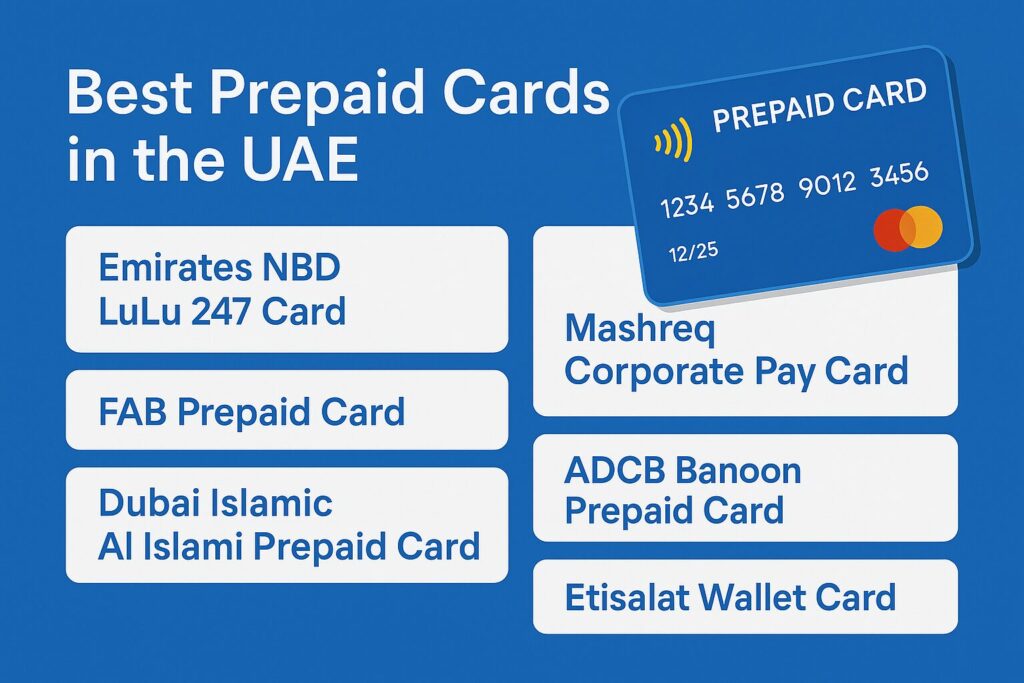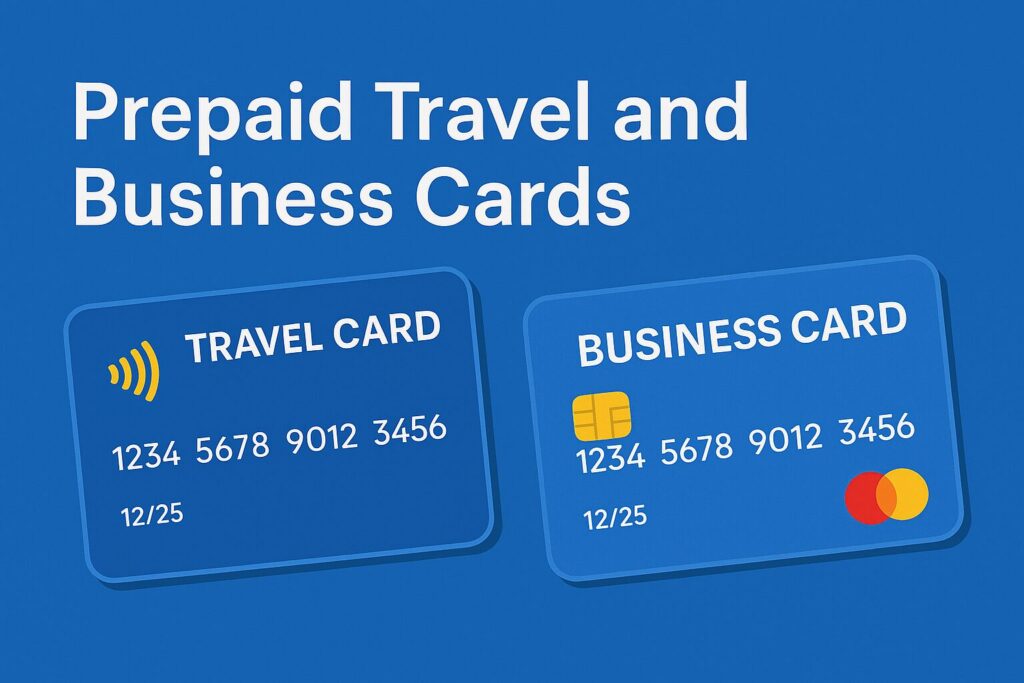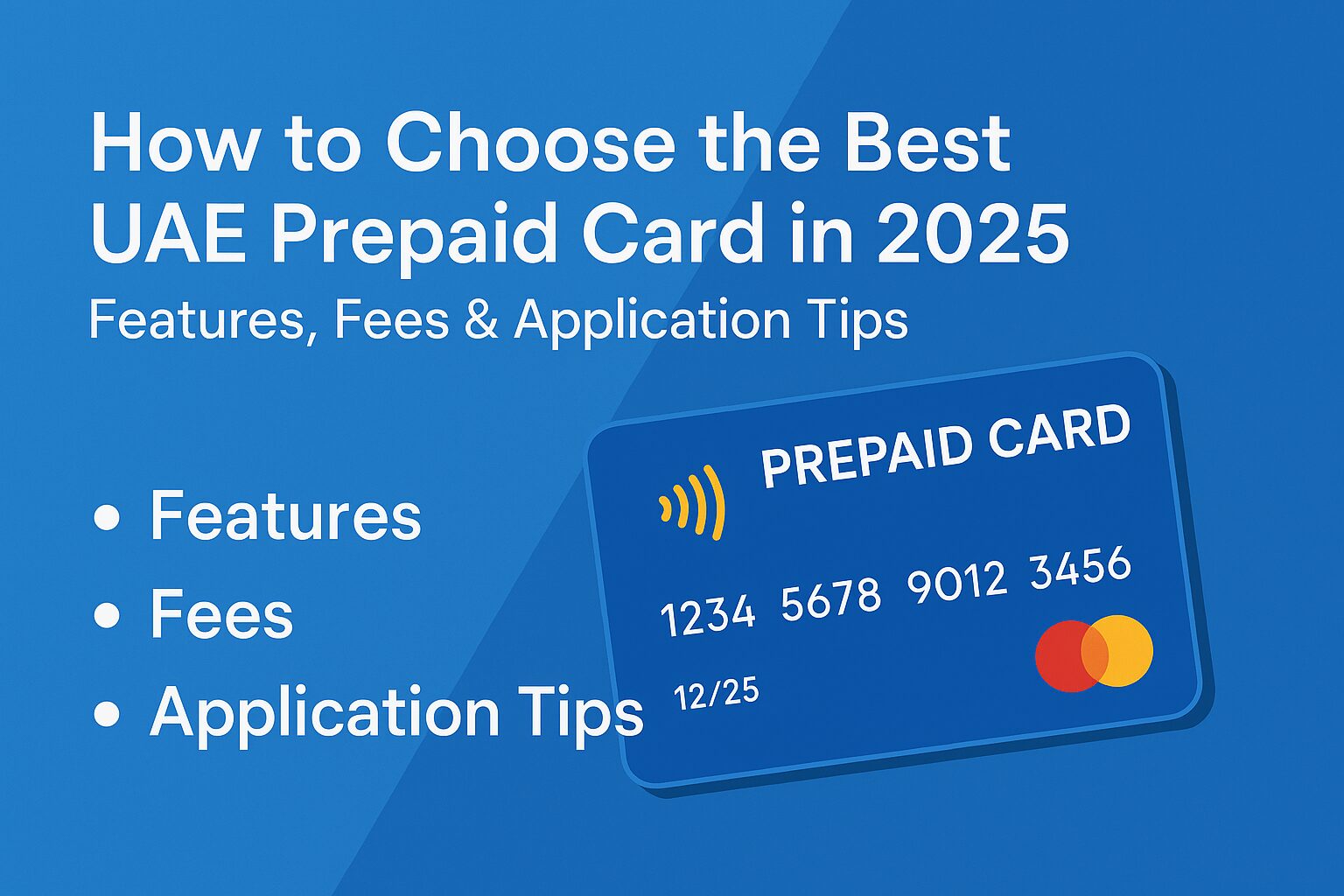How to Choose the Best UAE Prepaid Card in 2025 — Features, Fees & Application Tips
A UAE prepaid card is one of the most convenient ways to manage money without maintaining a full bank account. It allows you to load funds in advance and use them safely for shopping, travel, and online payments. Unlike credit cards, prepaid cards limit spending to your available balance, helping you control expenses and avoid debt.
These cards suit residents, travelers, students, and businesses seeking fast and secure payment methods. Leading issuers include Emirates NBD, First Abu Dhabi Bank (FAB), Mashreq Neo, Al Ansari Exchange, and Al Fardan Exchange. Regulated by the Central Bank of the UAE, prepaid cards ensure user protection, transparency, and ease of use across ATMs, stores, and digital platforms.
Whether for everyday purchases, salary payments, or international travel, prepaid cards have become essential tools for managing finances in the UAE’s digital economy.
What Is a UAE Prepaid Card and How Does It Work?
A prepaid card is a reloadable payment card that functions independently of a bank account. You load money onto it and use it for purchases or withdrawals until the balance is exhausted. It is accepted globally through Visa and Mastercard networks and regulated under UAE banking laws for safety and fraud prevention.
Prepaid cards can be obtained through banks, exchange houses, or fintech platforms. Funds are added via bank transfers, mobile apps, or cash deposit machines. Transactions are deducted instantly, offering a transparent and controlled way to manage expenses.
Definition and Key Differences from Debit and Credit Cards
| Feature | Prepaid Card | Debit Card | Credit Card |
| Source of Funds | Loaded balance | Linked account | Borrowed from bank |
| Bank Account Required | No | Yes | Yes |
| Credit Check | Not required | No | Required |
| Spending Limit | Balance only | Account funds | Credit limit |
| Risk of Debt | None | Low | High |
| Credit Score Impact | None | None | Yes |
| Ideal Use | Budgeting, travel, payroll | Daily expenses | Large purchases |
Prepaid cards are ideal for individuals seeking full spending control, secure digital payments, and freedom from debt.
How Prepaid Cards Function in the UAE Financial System
Prepaid cards are issued by licensed banks and exchange houses under Central Bank regulation. Identity verification through Emirates ID or passport is mandatory before activation. Reload options include online transfers, cash deposits, or employer salary credits.
Many cards, such as FAB’s Ratibi, support the UAE’s Wage Protection System (WPS). Others integrate with digital wallets like Apple Pay, Google Pay, and Samsung Wallet. Prepaid cards are also used in public systems such as Dubai’s Nol card, highlighting their role in the country’s cashless infrastructure.
Why Choose a Prepaid Card in the UAE?
Prepaid cards provide flexibility, spending control, and enhanced security. They are not linked to main bank accounts, which minimizes exposure to fraud. Transactions are tracked in real time, allowing better budgeting and transparency.
They are safer than carrying cash and easier to manage through mobile banking. The UAE’s shift toward a digital economy makes prepaid cards an efficient financial solution for individuals and businesses alike.
Benefits for Residents, Businesses, and Travelers
Residents use prepaid cards for budgeting, family allowances, and online shopping. Businesses rely on corporate prepaid solutions to manage employee expenses with spending caps and digital tracking.
Travelers benefit from multi-currency cards like Emirates NBD GlobalCash and Al Ansari TravelCard, which lock exchange rates and offer global acceptance. For workers and students, payroll and virtual prepaid options provide quick access to funds without requiring a full bank account.
Best Prepaid Cards in the UAE (2025 Update)
The UAE’s prepaid card market continues to grow, catering to both digital and traditional users. Below are standout options based on features and value:

| Prepaid Card | Ideal For | Key Highlights |
| Al Ansari Exchange TravelCard | Travel | Supports 23 currencies, FX rate lock, cashback offers |
| Emirates NBD GlobalCash | Frequent travelers | 15 currencies, automatic conversion, mobile reloads |
| FAB Ratibi Card | Payroll | WPS-compliant, for salaries ≤ AED 5,000 |
| Pyypl Virtual Prepaid Card | Digital users | Instant virtual Visa, no paperwork, global use |
| Wio Personal Virtual Card | Travelers, freelancers | 0 FX fees, cashback, instant issuance |
| Alaan Business Card | SMEs | Expense limits, real-time monitoring, accounting sync |
| Al Fardan Travelez | Global travel | 21 currencies, contactless, app management |
How to Apply for a Prepaid Card in the UAE
Applying for a prepaid card in the UAE is quick and straightforward through banks, exchange houses, or fintech apps.
Step 1: Choose a provider.
Banks like Emirates NBD and FAB offer general and travel cards, while Al Ansari and Al Fardan focus on multi-currency and remittance cards. Fintech apps such as Pyypl and Wio provide instant digital issuance.
Step 2: Prepare identification.
Residents need Emirates ID, passport, and visa. Non-residents can apply with a passport and valid entry stamp. Businesses require a trade license and authorized signatory documents.
Step 3: Submit the application.
Digital applicants complete KYC through an app; physical cards can be obtained at branches.
Step 4: Activate and fund the card.
Load funds through mobile banking, cash deposit machines, or salary transfers. Most virtual cards are active immediately.
Eligibility Requirements
- Residents: Minimum age 18; Emirates ID and visa required.
- Non-residents: Passport and entry visa; typically issued for travel use.
- Businesses: Trade license and authorized ID required for employee cards.
Online Prepaid Cards and Virtual Options
Virtual prepaid cards are increasingly popular in the UAE due to their speed and convenience. They can be issued instantly after ID verification and used worldwide for online and in-store purchases.
Providers like Wio, Pyypl, Mashreq Neo, and Emirates NBD offer 100% digital cards with mobile app control. Users can set spending limits, track expenses, and freeze cards when needed.
Best Digital Prepaid Visa and Mastercard Options
| Provider | Network | Key Highlights |
| Wio Personal | Visa | Multi-currency wallet, cashback, no FX fees |
| Pyypl | Visa | Paperless sign-up, reload via app, global use |
| Mashreq Neo | Mastercard | Cashback rewards, app-based control |
| Emirates NBD Virtual | Visa | 3D Secure protection, reload via app |
| Al Ansari Exchange Digital | Visa | 23 currencies, instant issuance |
| Alaan Business | Visa | Corporate virtual cards, cashback on FX spends |
Where to Get a Prepaid Card in Dubai and Abu Dhabi
Prepaid cards are available through exchange houses, banks, and fintech apps across the UAE’s main cities.
Exchange Houses
- Al Ansari Exchange: FlexiblePay and TravelCard with instant issuance at 200+ branches.
- Al Fardan Exchange: Travelez Visa supports 21 currencies and rate locks.
- LuLu Exchange: Prepaid cards available at major mall branches.
Banks
- Emirates NBD: GlobalCash Card with mobile reloads and Mastercard acceptance.
- FAB: Ratibi Card for payroll and multi-currency travel use.
- Emirates Islamic: Shariah-compliant prepaid Mastercard with online reloads.
- Mashreq Neo: Instant virtual prepaid cards through mobile app.
Fintechs
- Pyypl: Instant virtual Visa via app.
- Alaan: Corporate prepaid card platform.
- Wio Personal: Multi-currency virtual card with cashback and no FX fees.
UAE Exchange Prepaid Card Overview
UAE Exchange, now operating under the Unimoni brand, offers limited prepaid services after restructuring. The GoCash Prepaid Card supports multiple currencies and chip-based security but is less widely used compared to newer providers like Al Ansari and Emirates NBD.
How to Use, Reload, and Withdraw Money from Prepaid Cards
Prepaid cards can be used for in-store payments, online purchases, and ATM withdrawals. They are compatible with contactless and mobile wallet systems for fast transactions.
Reloading Methods:
- Mobile app or online banking: instant, often free
- Cash deposit machines: instant, no fee at issuer ATMs
- Bank transfer: 1–2 hours via UAE FTS
- Branch reload: instant but may include small service fees
Withdrawal Limits:
- Domestic ATMs: AED 5,000–10,000 per day
- International ATMs: AED 3,000–5,000 per day
- Fees: AED 2–20 depending on location
Tips to Avoid Prepaid Card Fees
- Use the issuing bank’s ATMs to avoid cross-bank fees.
- Reload in bulk to reduce transaction costs.
- Avoid Dynamic Currency Conversion when abroad.
- Keep the card active to prevent inactivity fees.
- Review all fee details in the provider’s Key Facts Statement.
Prepaid Travel and Business Cards
Travel Prepaid Cards
These cards simplify global spending with locked exchange rates and multi-currency wallets.
| Card | Currencies | Key Features |
| Al Ansari TravelCard | 23 | Visa Platinum, app control, wallet support |
| Emirates NBD GlobalCash | 15 | Automatic currency selection, insurance, reloadable |
| Al Fardan Travelez Plus | 21 | Reloadable, contactless, real-time tracking |
They allow travelers to spend securely abroad while protecting against currency fluctuations.

Business Prepaid Cards
Corporate prepaid cards help companies manage employee expenses, payroll, and project budgets with real-time visibility.
| Provider | Highlights |
| Alaan | Unlimited employee cards, spend limits, cashback |
| FAB Corporate | WPS-compliant payroll, reloadable via CDMs |
| Pluto / Pemo | Expense automation, accounting integration |
These solutions enhance expense control and reduce manual processing across SMEs and enterprises.
Prepaid Visa and Mastercard Cards in the UAE
Visa and Mastercard dominate prepaid card issuance across UAE banks and fintechs. Both offer global acceptance and comparable security features.
| Feature | Visa Prepaid | Mastercard Prepaid |
| Acceptance | 80+ million merchants | 90+ million merchants |
| Security | Verified by Visa, EMV chip | SecureCode, EMV chip |
| Perks | Visa Platinum benefits | Priceless Cities, purchase protection |
| Best For | Travelers, digital users | Business, fintech users |
Visa is more common among banks and travel cards, while Mastercard is favored by digital and Islamic finance solutions.
Common Questions About UAE Prepaid Cards (FAQs)
Can I get a prepaid card in the UAE without a bank account?
Yes. Most prepaid cards do not require a bank account for issuance.
Providers accept Emirates ID for residents and passport for visitors.
Exchange houses and fintech apps often issue cards instantly in-branch or via app.
Can non-residents or tourists obtain a prepaid card?
Yes. Travel-focused prepaid cards are available to non-residents and tourists.
You typically need a valid passport and a UAE entry stamp.
Exchange houses issue multi-currency travel cards instantly at many branches.
How do I apply for a prepaid card and what documents are required?
Application can be digital or in person at a branch.
Residents usually present Emirates ID, passport, and residence visa.
Non-residents show passport and entry stamp when applying for travel cards.
Businesses need a trade license and authorized signatory documents for corporate cards.
How do I check my prepaid card balance and transaction history?
Most providers offer real-time balance and transaction history via mobile apps.
You can also check balances through online banking portals and branch counters.
ATMs allow balance inquiries, though some machines may charge a small fee.
Can I use a prepaid card for online shopping and subscriptions?
Yes. Prepaid cards work for online purchases and recurring subscriptions.
Cards supporting 3D Secure add an extra authentication step for safety.
Virtual cards are especially useful for single-purpose online shopping and subscriptions.
Are prepaid cards safe to use for payments and withdrawals?
Yes. Prepaid cards include EMV chip, PIN protection, and mobile controls.
You can freeze or block the card instantly using most provider apps.
Exposure is limited because the card only holds the loaded balance.
Can I withdraw cash from ATMs with a prepaid card?
Yes. Most Visa or Mastercard prepaid cards support ATM cash withdrawals.
Domestic and international ATM fees can apply depending on the issuer.
Virtual-only cards or some corporate cards may restrict cash withdrawal functionality.
What fees should I expect with prepaid cards in the UAE?
Common fees include issuance, reload, ATM withdrawal, and inactivity charges.
Issuance fees range from modest to waived, depending on provider policies.
Reload fees vary by channel; digital top-ups are often cheaper or free.
Always review the provider’s Key Facts Statement for exact fee details.
Can I hold multiple currencies on one prepaid card?
Yes. Many travel and exchange-house cards support multiple currency wallets.
You can lock exchange rates by preloading foreign currencies before travel.
Multi-currency cards reduce FX markups and simplify spending abroad.
Conclusion: Choosing the Right Prepaid Card for Your UAE Lifestyle
There is no single best prepaid card in the UAE. The right option depends on your goals budgeting, travel, business, or payroll.
Residents may prefer Pyypl or Emirates Islamic prepaid cards for daily use. Businesses can benefit from Alaan or FAB Ratibi for controlled expense management. Travelers will find Al Ansari TravelCard or Emirates NBD GlobalCash ideal for multi-currency convenience.
When comparing, focus on fees, reload options, currency support, and security features. Prepaid cards have become vital financial tools for individuals and organizations, combining flexibility, safety, and modern convenience in the UAE’s evolving cashless landscape.

Omar Hassan, your trusted guide to navigating the UAE banking landscape. With over 15 years of experience in the industry and a Master’s degree in Finance, Omar leverages his expertise to provide clear and insightful information on balance checking methods, bank comparisons, and financial management tips for UAE residents.



